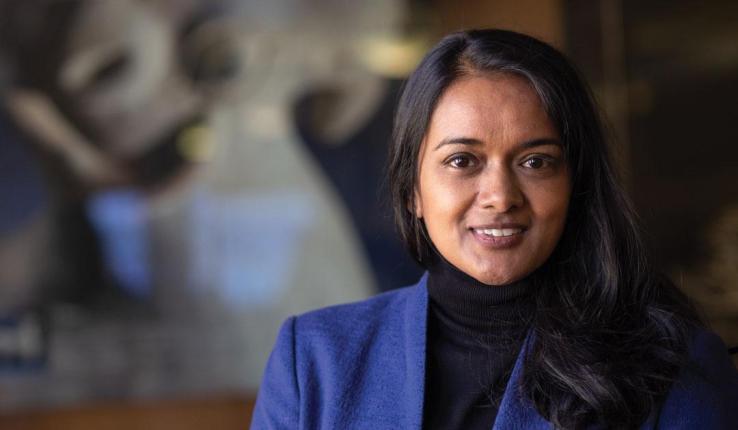The Relationship Between Trust and Bias

A lack of trust might prevent even the most egalitarian individual from behaving in a completely egalitarian way. Dominic Packer studies the relationship between trust and bias.
The Trust Gap
Over the past half-century, the United States has seen steady declines in public levels of prejudice toward minority groups, says Dominic Packer. However, disparities between racial groups haven't shifted much. If attitudes about equality have seemingly changed, why wouldn't behaviors change as well?
One popular explanation for this circumstance is the notion of implicit bias, or rapid evaluative responses: unconscious and automatic negative attitudes that affect how we think, speak and act with regard to characteristics such as race or ethnicity. Packer, associate professor of psychology, is exploring an alternative explanation: the trust gap.
People, Packer says, are more inclined to trust members of a group with which they affiliate and less inclined to trust someone from a group other than their own. Packer calls this the trust gap, and he says it might be bridged with mechanisms that help build trust and increase people's willingness to work outside their own groups. At the societal level, these mechanisms are social institutions like government, law enforcement, the criminal justice system and the media. If effective, says Packer, these external mechanisms can support cooperation between individuals and reduce preferences for "ingroup members." However, as overall trust in the the United States' major institutions has declined dramatically, the trust gap could have significant ramifications for intergroup relations.
Declining Trust, Increasing Bias
Packer and his team have found that the more people trust in social institutions, the less preferential bias they exhibit in everyday life. In a series of three studies described in a paper titled "Dynamic tuning of evaluations: Implicit racial attitudes are sensitive to incentives for intergroup cooperation," he and graduate student Shiang-Yi Lin assigned participants to artificial groups and told them they would be playing trust games with members of their own group versus another group. The participants, who were all white, were shown photographs of the black and white individuals who would play the games with them, aware that they would have to decide whether or not to trust their partners.

In one version of the study, Packer and Lin created an external institution, or "punisher," who, they told participants, would monitor the games and either punish unfair behavior in one condition or reward fair behavior in another condition. Participants, in this case, understood that the punisher provided their partner, regardless of group affiliation, with an incentive to behave appropriately. Prior to playing the games, Packer and Lin had participants complete an implicit bias measure toward black and white faces.
"What we find is that if participants think they're going to play these trust games and that's it, there's no punisher present, then we see the standard, pro-white bias on the measure among our white participants," says Packer. "But if they believe they can play the games later and there's going to be a punisher present, then that pro-white bias is gone."
Similarly, says Packer, if social institutions, society's "punishers," are deemed corrupt or unworthy of trust, bias increases. If a society feels unsafe, says Packer, "you're going to choose to rely on the people you either know personally or at least you have some common identity with because they'll be more likely to treat you well."
Packer believes this might explain why disparities between groups in the U.S. have not changed, despite a decline in public levels of prejudice.
A June 2016 Gallup poll of confidence in institutions revealed that the overall average of Americans expressing "a great deal" or "quite a lot" of confidence in U.S. institutions is at just 32 percent. Nearly all American institutions have been experiencing a steady decline in confidence. Confidence in Congress, for example, has dropped to 9 percent.
These overall low levels of confidence might be making Americans more insular, says Packer. Although variation does exist by community and between individual people, if an individual no longer trusts social institutions to regulate society, that individual will find other means. Turning inward is one path they might take.
"It's just easier to trust in-group members, so you end up defaulting to that even though you value equality. ... If you add that up across lots of interactions, you could still have a great deal of discriminatory outcomes even though you've got a lot of positively motivated people," says Packer.
This story appears as "The Trust Gap" in the 2017 Lehigh Research Review.
Posted on:




